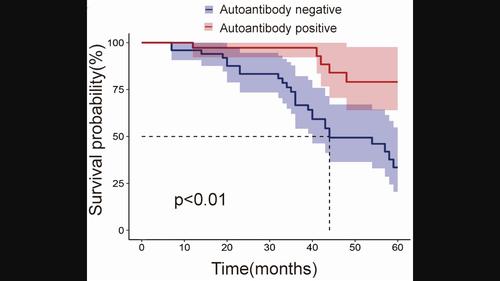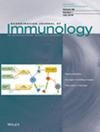The presence of autoantibodies as a potential prognostic biomarker for breast cancer
IF 4.1
4区 医学
Q2 IMMUNOLOGY
引用次数: 0
Abstract
The presence of autoantibodies is closely associated with the occurrence and development of cancer. Autoantibodies can be used as biomarkers for early breast cancer diagnosis. However, the relationship between autoantibodies and the prognosis of breast cancer patients remains elusive. This retrospective study aimed to investigate the correlation between the presence of autoantibodies and outcomes in breast cancer patients. This study included a total of 155 patients from People's Hospital of Henan University (Zhengzhou, China) who were diagnosed with breast cancer from January 2017 to December 2021. The enrolled patients' clinicopathological features were collected, and 88 patients were ultimately involved in the analysis. Univariate and multivariate Cox regression analyses were performed to search for the risk factors related to the poor prognosis of breast cancer patients. The association between the presence of autoantibodies and patients' survival was analysed using Kaplan–Meier curves. After screening, there were 38 autoantibody‐positive cases and 50 autoantibody‐negative cases. Breast cancer patients with autoantibody‐positive had a 57% lower risk of death compared with autoantibody‐negative patients. Multivariate Cox regression analysis indicated that the presence of autoantibody could be a potential prognostic predictor for breast cancer, independent of age, histological grade, pathological classification, clinical stage, and the expression levels of hormonal receptors. In addition, autoantibody‐positive breast cancer patients had longer progression‐free survival and overall survival compared with autoantibody‐negative cases. Positive autoantibody was found as an independent biomarker of better prognosis in breast cancer patients, providing a new strategy for the prognostic assessment of breast cancer patients.

作为乳腺癌潜在预后生物标志物的自身抗体的存在
自身抗体的存在与癌症的发生和发展密切相关。自身抗体可作为早期乳腺癌诊断的生物标志物。然而,自身抗体与乳腺癌患者预后之间的关系仍然难以捉摸。这项回顾性研究旨在探讨自身抗体的存在与乳腺癌患者预后之间的相关性。本研究纳入了河南大学人民医院(中国郑州)2017年1月至2021年12月期间确诊的155例乳腺癌患者。收集了入组患者的临床病理特征,最终有88名患者参与分析。通过单变量和多变量Cox回归分析,寻找与乳腺癌患者不良预后相关的危险因素。采用 Kaplan-Meier 曲线分析了自身抗体的存在与患者生存期之间的关系。经过筛查,共有 38 例自身抗体阳性病例和 50 例自身抗体阴性病例。与自身抗体阴性患者相比,自身抗体阳性乳腺癌患者的死亡风险降低了57%。多变量考克斯回归分析表明,自身抗体的存在可能是预测乳腺癌预后的潜在指标,不受年龄、组织学分级、病理分类、临床分期和激素受体表达水平的影响。此外,与自身抗体阴性病例相比,自身抗体阳性乳腺癌患者的无进展生存期和总生存期更长。研究发现,自身抗体阳性是乳腺癌患者预后较好的独立生物标志物,这为乳腺癌患者的预后评估提供了一种新策略。
本文章由计算机程序翻译,如有差异,请以英文原文为准。
求助全文
约1分钟内获得全文
求助全文
来源期刊
CiteScore
7.70
自引率
5.40%
发文量
109
审稿时长
1 months
期刊介绍:
This peer-reviewed international journal publishes original articles and reviews on all aspects of basic, translational and clinical immunology. The journal aims to provide high quality service to authors, and high quality articles for readers.
The journal accepts for publication material from investigators all over the world, which makes a significant contribution to basic, translational and clinical immunology.

 求助内容:
求助内容: 应助结果提醒方式:
应助结果提醒方式:


